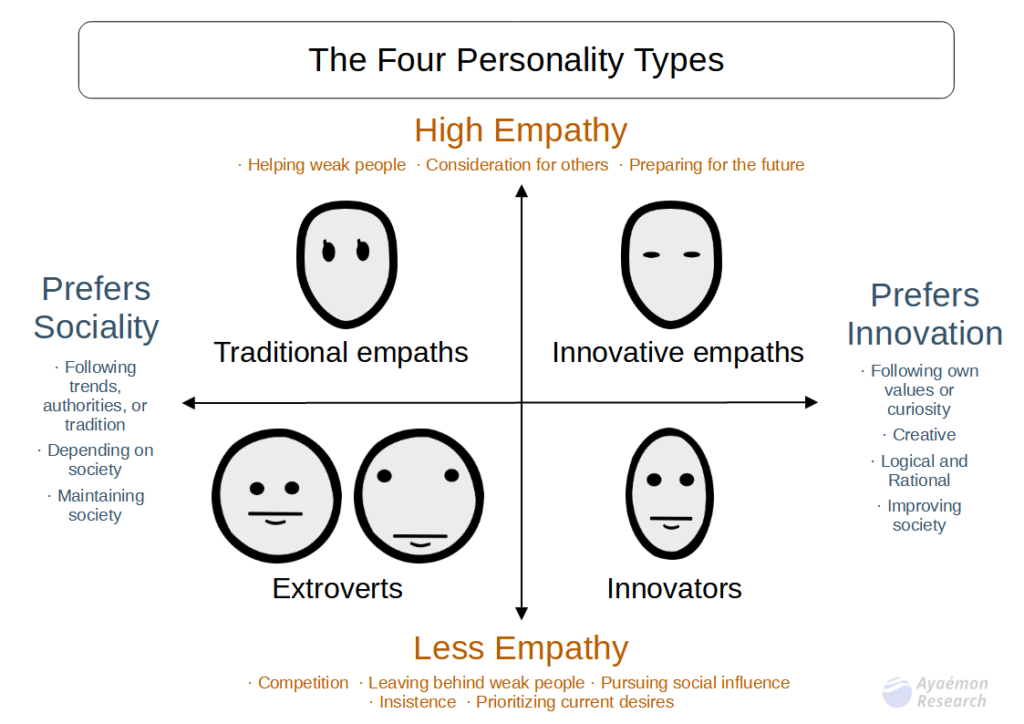Now I am training my logical muscle. I am consciously making decisions as rationally as possible. It limits my intense empathy.
In the previous article (this article), I said that refined logic is forgiveness if we describe it with spiritual words. Today, I will explain its logic.
How to obtain forgiveness
Sometimes, we want forgiveness. It would be one thing that highly empathic people desire the most. For mentally exhausted people, it may mean happiness. We want an allowance to exist.
Empathy and the sense of guilt cause it. If we imagine someone suffering, we feel pain ourselves. It is empathic work. If we think we have caused it, we reflect on our actions. That sense is guilt.
However, we sometimes cannot escape guilt because of unchangeable circumstances. We cannot change our nature. If someone doesn’t like our personalities, we continuously make them feel negative. That causes deep guilt and our desire for forgiveness.

If we have unique individuality, we tend to experience it. That is why we want forgiveness.
However, we often don’t know how to resolve it.
One solid way would be cultivating logical sense. In other words, refined logic is forgiveness for empathic people. Fortunately, I experienced its effect recently. Today, I will explain why.
Forgiveness for the past, present, and future
Refined logic would be forgiveness for empathic people.
Its effect consists of several levels: the past, present, and future. They are as follows:
- Rational judgment limits empathy. This frees us from past sins and grudges.
- Knowing the reasons behind others’ behaviors allows us to forgive them.
- Knowing about our natures allows us to forgive ourselves.
- Developing our philosophy prevents similar experiences of feeling guilty in the future.

Let’s look at them in detail below.
Forgiveness for the past
First, rational judgment limits empathy. This frees us from past sins and grudges.
Emotions disappear if we decide our behaviors, as I have explained often lately.
Our decision will be one of the following two:
- We will activate the body.
- We will relax the body.

If we feel an emotion related to past sins or grudges, we try to find rational reasons and decide to relax based on them. We repeat it whenever we remember stressful pasts.
As we develop our logical sense, we can clear these emotions sooner. We will no longer even remember in the end.
My case of resentment
For example, in my case, I noticed I held a grudge against one of my relatives. She owned the house I had lived in until last winter. Her whim affected my move.
Although I knew I should be grateful to her for being allowed to stay in that house, I also resented her sudden change of mind.

If we decide to activate the body by our emotions, we often feel such exciting emotions like me. Anger, grudge, excitement, envy, and joy are the same in terms of energizing the body. That is why anger and joy are often indistinguishable. People enjoy anger.
Relaxing the body
In such a case, we can intentionally decide to relax the body rationally. That limits empathy and stops emotions.
In my case, I persuaded myself, “Do I want to spend my life consumed by such hatred? It is nonsense and a waste of time. It is much more rational to think about improving my life. Even if I wish for her misfortune, it will leave a bad taste if it happens. Forget it and relax the body.”
Making the decision and relaxing my body makes the emotion disappear naturally.

I often intentionally use the feelings of disappointment, depression, and discouragement. They are the same in terms of relaxing the body. They help me become logical.
Repeating it frees us from past sins and grudges.
Forgiveness for the present
The second is knowing the reasons behind others’ behaviors. It allows us to forgive them. In addition, if we know about our natures, we can forgive ourselves. They are forgiveness for the present.
If we understand people’s behavioral principles, we can accept their actions.
A typical example is the backstory of the antagonist in the story. An enemy dislikes the protagonist and attacks unreasonably. Then, the protagonist wins with his wisdom and defeats the villain.

When their battle is settled, we often have the backstory of why the antagonist came to dislike the protagonist. There have been sad experiences and misunderstandings in the past. We make sense of why he hated the protagonist.
That allows us to forgive the villain. He sometimes becomes an ally of the protagonist.
The reasons behind others’ behaviors allow us to forgive them.
The four types of personality
The four types of personality that I often use are examples as well. It is as shown in the following image:

It tells us about the behavioral principles of others and ourselves. It can grant us forgiveness.
Forgiveness for the future
Finally, developing our philosophy prevents similar experiences of feeling guilty in the future.
Despite others’ behavioral principles, we can be stressed. There are certainly people who strain us. The relationship would not change unless the situation changes. In other words, we have to change our behavior.

In such a case, we can develop our philosophy. We clarify what is to be sacrificed and what is to be secured. Appropriate principles give us peace of mind.
In other words, a poor philosophy causes our exhaustion. Without developing it, we cannot be at ease, no matter how patient we are.
Rationality allows us to refine our principles. Refined philosophy rewards us for our patience.
Conclusion
That is why refined logic can be forgiveness for empathic people.
One solid way would be cultivating logical sense. It might work efficiently rather than focusing on empathy.
This approach might resolve your desire for forgiveness.
Thank you for reading this article. I hope to see you in the next one.


